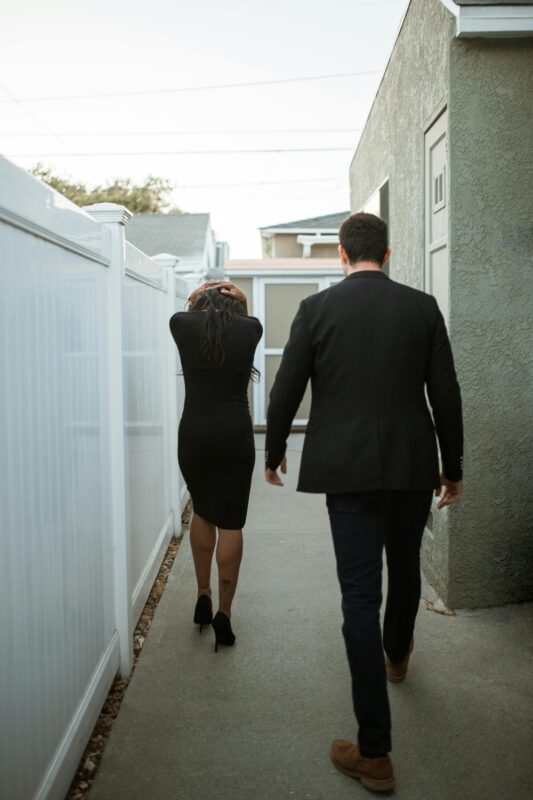Allure of Fantasy and Pornography Consumption in Australia
James sat at the kitchen table, staring at the cold remnants of his dinner. Clair had already gone upstairs, her usual routine of putting the kids to bed stretching into an unspoken retreat from him. The sound of muffled laughter from their daughter’s room drifted down the hallway, but James barely registered it. His fingers twitched toward his phone, a reflex he no longer questioned.
A few taps, and the screen flooded with images—flawless bodies, eager smiles, the illusion of desire crafted to pull him in. It had started as a casual distraction, something to take the edge off his growing frustration. But now, it was more than that.
Clair still kissed him goodbye in the mornings. They still exchanged texts about groceries and school pickups. But the touch that once lingered had faded. The knowing glances, the spontaneous brushes of affection—they had been swallowed by the demands of parenthood, of life. And James, though he never meant to, had started looking elsewhere.
At first, it was just watching. A video here, a subscription there. Platforms like OnlyFans made it easy—too easy. The women weren’t just pixels on a screen; they spoke to him, used his name, laughed at his jokes. They made him feel seen in a way Clair hadn’t in years. The rush was addictive, but the high never lasted.
The first time he hired an escort, his hands trembled as he knocked on the hotel room door. When it swung open, the woman inside greeted him with a practiced warmth that sent a thrill through his veins. She was perfect—every detail designed to cater to the fantasy. The way she touched him, the way she leaned in and listened, her lips curling into an inviting smile—no hesitation, no exhaustion, no unspoken resentment.
For the first time in years, James felt wanted.
But the satisfaction was fleeting. One meeting turned into another. Then another. Each time, he left the encounter with a temporary sense of control, only for the weight of reality to settle back onto his shoulders the moment he walked through his front door. Clair would be sitting on the couch, scrolling through her phone or folding laundry, oblivious to the guilt pressing against his ribs.
And yet, he couldn’t stop.
The Breaking Point
One evening, James returned home late. The house was dark except for the soft glow of the kitchen light. Clair sat at the table, a printed bank statement in front of her.
He stopped in the doorway. His heart pounded against his ribs.
“James,” she said, her voice steady but tight. She lifted her eyes to meet his, and the hurt in them cut through him like a blade. “What is this?”
The silence stretched between them, thick with everything unsaid. James swallowed hard, but no excuse came. He had rehearsed justifications in his head—work stress, a lapse in judgment, meaningless indulgence—but none of them would erase the truth now lying exposed between them.
Clair exhaled, shaking her head. “I feel like I’m losing you to something I can’t compete with.” Her voice wavered, but she held his gaze. “I want to understand what you’re missing so we can work on it together.”
James’s chest tightened. He expected anger, accusations, maybe even tears—but this? This quiet plea, this willingness to fight for something he had nearly thrown away, was more than he deserved.
His throat closed around the words, but finally, he admitted, “I don’t know how to stop.”
Rebuilding
Therapy was brutal at first. James sat stiffly in the chair, arms crossed, while Clair spoke about feeling unseen, unappreciated. He had spent so long blaming her distance for his actions that he hadn’t realized she had been drowning, too.
“James needs spontaneity, adventure,” the therapist noted. “Clair, you need emotional security before you can open up to that. You’ve both been missing each other’s signals.”
Slowly, painfully, they started to bridge the gap.
James deleted his subscriptions. The first night without the numbing distraction of a screen felt unbearable. He lay awake, fighting the itch to reach for his phone, to chase the fleeting thrill. But then Clair shifted beside him, her body warm against his. He turned toward her, hesitant, unsure.
She didn’t pull away.
It wasn’t an instant fix. There were moments of tension, of withdrawal, of doubt. But with time, they learned to see each other again—not as exhausted parents or passing strangers in the same house, but as partners.
James had spent years chasing illusions, mistaking fantasy for fulfillment. But real love—messy, imperfect, complicated—was worth the fight.
And for the first time in a long time, he was ready to fight for it.
Why This Works Better
• More Action & Sensory Detail: Instead of summarizing James’s habits, I show his behaviors in real time—his physical reactions, his surroundings, the tension in his interactions.
• Stronger Emotional Impact: We see Clair’s discovery unfold naturally, making her reaction feel more poignant.
• More Immersive Experience: By putting the reader in James’s head, we make his struggle feel visceral rather than just described.

